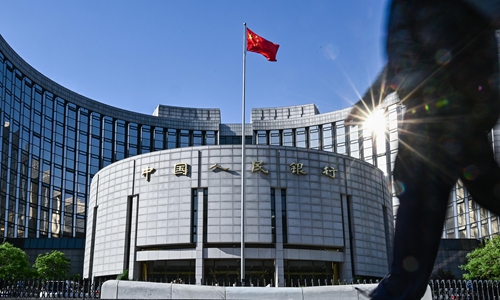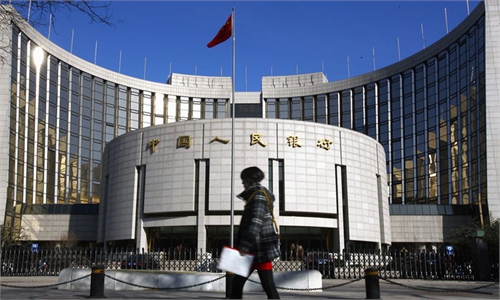China, in better position to manage monetary stance, unlikely to join rate-hike trend: economists
China has very low inflation, unlikely to tighten monetary policy soon

China's central bank on Monday cut benchmark lending rates by the steepest margin since August 2019 when the market-oriented loan prime rate regime was adopted. The nation is striving to repair the damage of the coronavirus outbreak,which caused GDP to contract in the first quarter. Photo:cnsphoto
Emerging economies including Brazil, Turkey and Russia have announced interest rate hikes in the face of soaring inflation, fueling speculation about a broader rate rise in emerging economies.
China is under pressure from imported inflation, but the country is in a better position to manage its monetary policy, economists said, and there's little chance that rate hikes elsewhere will spur China's central bank to follow suit.
Brazil's central bank surprised the markets with a 75 basis point (bps) hike on March 17, its first rate increase in six years, which lifted its key rate to 2.75 percent.
The move is likely to be followed by a similar increase in May, as the South American economy's annual inflation rate hit 5.2 percent in February, well above a target of 3.75 percent the central bank set for the year.
One day later, Turkey's central bank followed suit with an even stronger rate spike - its benchmark interest rate was lifted by 200 bps to 19 percent - as its annual inflation rate shot to 15.6 percent in February.
In the case of Russia, where annualized inflation picked up to 5.7 percent last month, the Bank of Russia hiked its key interest rate by 25 bps to 4.5 percent on Friday, the first rate increase since 2018. Further rate hikes are likely, according to the bank.
The hikes by the three emerging economies stoked fears over another round of higher interest rates across all emerging economies.
The first-movers are feeling pressure from the US Federal Reserve's decision to pull the plug on a year-long pandemic bank capital relief policy, which stirred concerns over capital flows back to the US, Lian Ping, head of Zhixin Investment Research Institute, told the Global Times on Tuesday.
The end of the Fed's supplementary leverage ratio leniency for banks could result in a pullback from purchases of US Treasuries and send yields on longer-term government bonds higher, sending ripples through the market and unnerving those fearing subsequent capital outflows, Lian explained.
The rate increases was taken to tame inflation and curb capital outflows, and they won't signal the beginning of a rate hike cycle, market watchers said.
Underpinned by strong fundamentals, China remains very appealing to global investors, Lian commented. That China didn't resort to massive stimulus over the past year also makes the case for the country to stay calm despite growing divergences in monetary policy between emerging markets and the developed ones, notably the US, he added.
In a speech to the just-concluded China Development Forum, Yi Gang, governor of the People's Bank of China (PBC), the country's central bank, said the country has relatively wide leeway in fine-tuning its monetary policy.
China's monetary policy has stayed within a normal range, with ample policy tools and moderate levels of interest rates, according to Yi, who pledged to maintain policy continuity, stability and sustainability.
Monetary policy needs to strike a balance between supporting economic growth and preventing risks, Yi noted.
In a research note sent to the Global Times on Tuesday, DBS economists voiced disagreement with market pricing that "the next Asian hike cycle would start earlier than the Fed's own cycle (that is estimated to arrive before 2023)."
Reflecting on some peer emerging market central banks' rate hikes in a big way over the past days, the DBS economists said that Asia has the "flexibility to more gradually normalize monetary settings."
On the part of China, the PBC's seven-day reverse repurchase rate is forecast to remain unchanged, and two-way fluctuations in the seven-day repo fixing to average in a range of 2.2-2.3 percent over the next year, they estimated.
Analysts have priced in imported inflation concerns, particularly on the producer price side.
Rising prices of commodities - including crude oil and metals - would lead to an increase in the producer price index (PPI), which according to Lian could spike to 5-6 percent in some months.
China's PPI came in at 1.7 percent in February, up from a gain of 0.3 percent in January, official data showed.
But the PBC would only consider a rate hike if PPI inflation continues for a prolonged period, which would extend into the consumer market. The PBC would also react if economic expansion moved into an overheating mode with an annualized rate of roughly 9 percent, said Lian.
China's consumer price index contracted 0.2 percent in February from a year earlier, following a decline of 0.3 percent in January.


